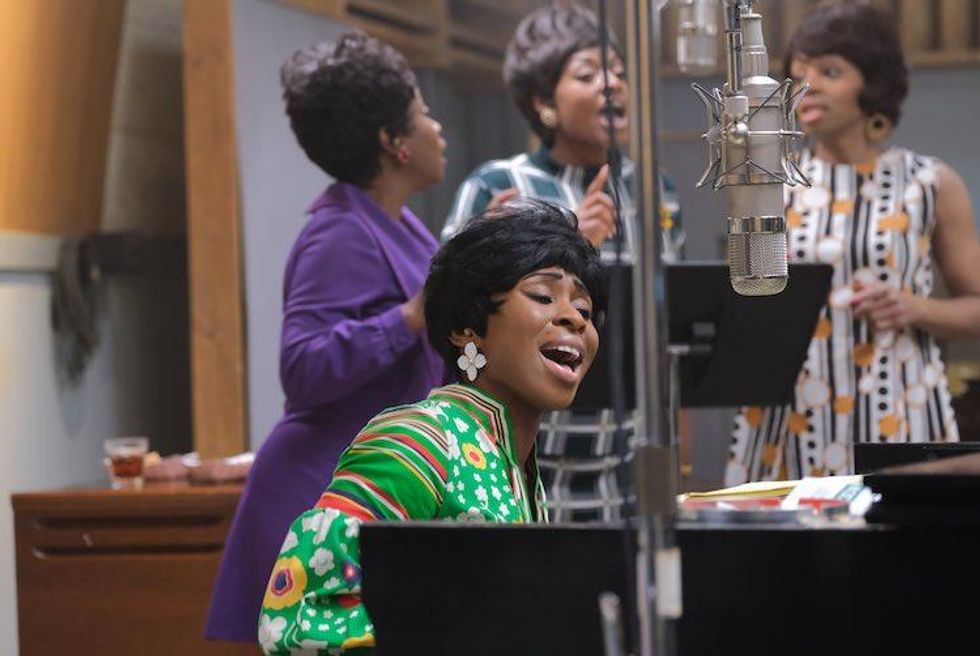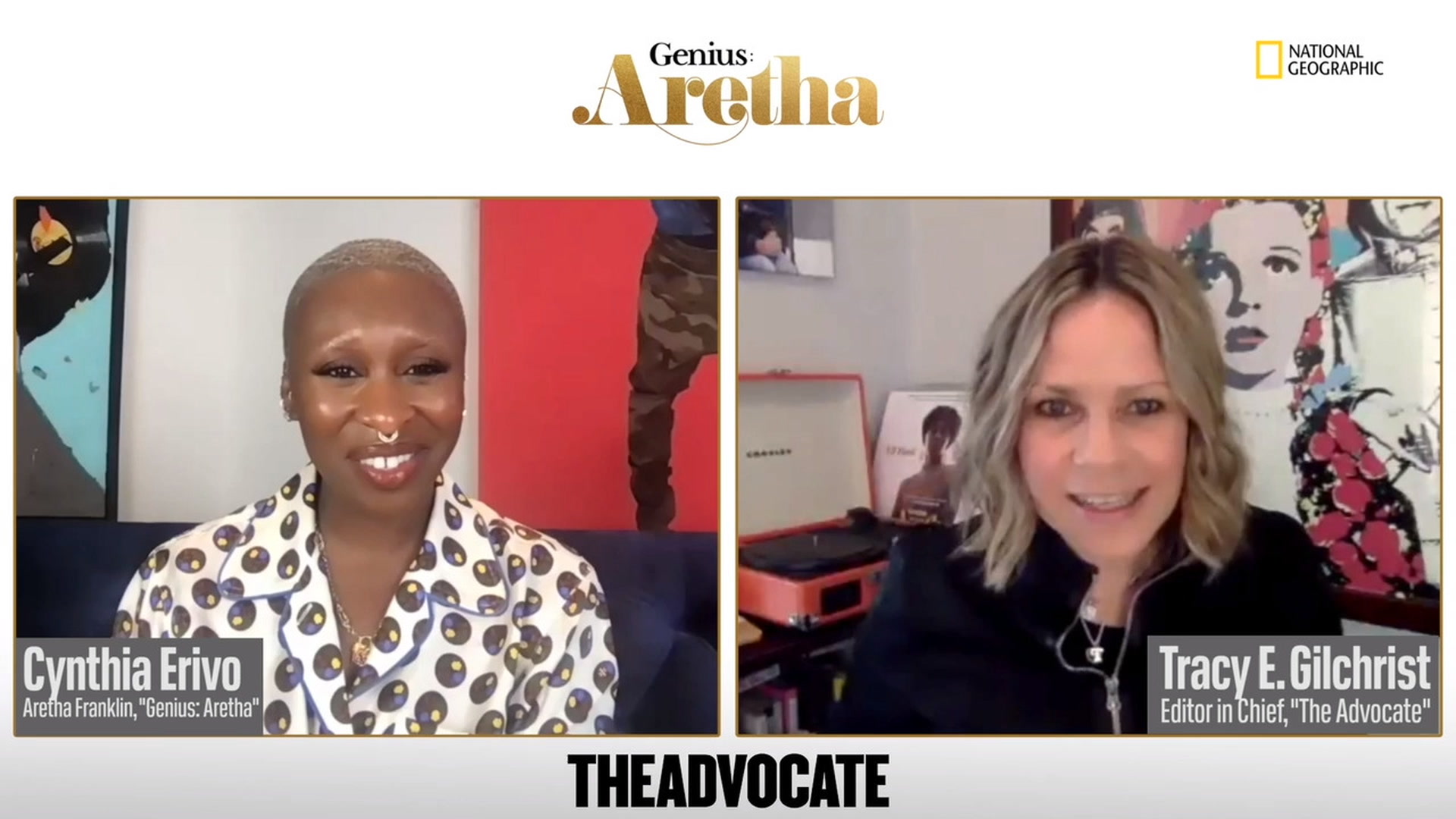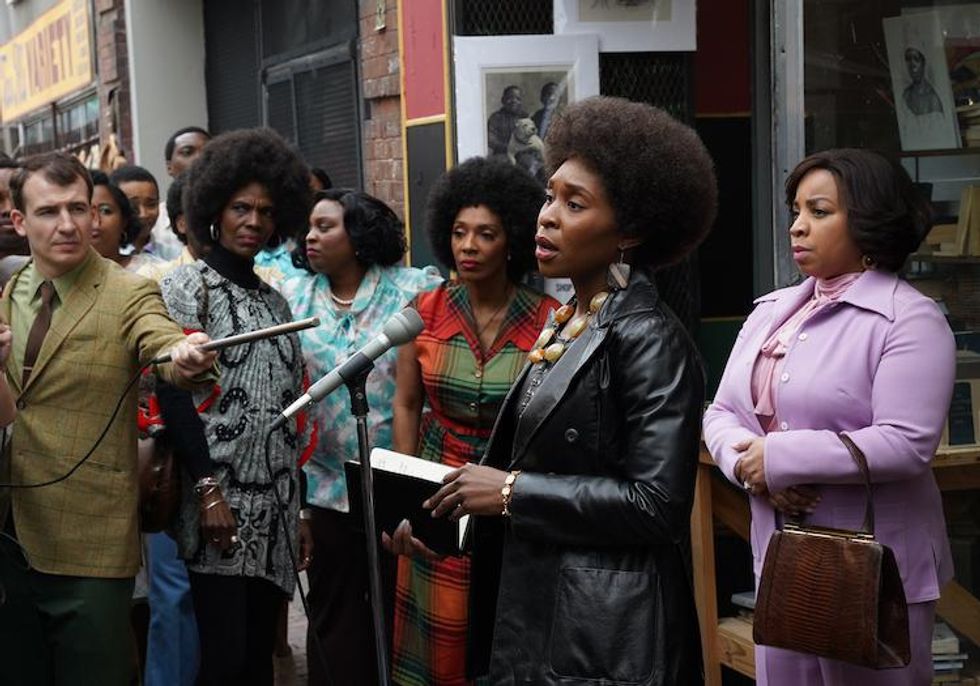Tony winner Cynthia Erivo's first recollection of Aretha Franklin's music is of being in the back of her mom's blue Ford on the way to school when "Think," the infectious song the Queen of Soul belts in The Blues Brothers, came on the radio. And it stuck with Erivo. The next time she remembers hearing Franklin was on the same station that played eclectic music, but it was in an altogether different kind of tune. It was "Sisters Are Doin' It for Themselves," a feminist banger from the '80s synth-pop duo Eurythmics that had Franklin and the group's vocalist Annie Lennox belting lyrics in which women reclaimed their space.
"I just remember thinking, Who does this? Because I recognize the voice again. I think, How does one person do [all] these types of songs, and still, both of them connect with me? I remember thinking, I wish I could do that. There's something really special about her voice," Erivo tells The Advocate.
It's a few decades later, and Erivo has now slipped into Franklin's famous furs to play the legend for NatGeo's eight-episode series Genius: Aretha. The role is a natural fit for Erivo, who's played icons, both fictional and very real, before. She won her Tony for playing the queer character Celie in the 2015 Broadway revival of The Color Purple. And she wowed audiences with her visceral portrayal of abolitionist Harriet Tubman in Kasi Lemmons's 2019 film Harriet.

As is well known and as Genius: Aretha tells it, Franklin (who died of pancreatic cancer in 2018) was a gutsy woman of immeasurable talent and musical acumen who withstood hardships and institutional racism as she climbed the charts to become music royalty. The series also shines a light on Franklin's civil rights work, touring with Dr. Martin Luther King Jr., among other actions. Beyond that activism, her resilience became an inspiration and her music a salve for LGBTQ+ people, especially with songs like "Respect" and her glorious refrain of "freedom" in "Think." Playing the role of Franklin is right in the pocket of storytelling for Black and queer people that Erivo says is critical.
"It's unbelievably important to keep telling stories that give space and solace to LGBTQ+ members, Black members of our society, of our communities, because there isn't enough, there's not enough space," Erivo says. "I think the more we can see it, the more we get to understand that we deserve space too. And we have to be seen so that we can make great things, that we can create great art, and that our experiences are valid too."
"It means a lot to me to be able to be part of that community. It means a lot for me to be able to tell those stories too. I hope we keep making space to tell them," she says.
The third season of Genius (previous seasons focused on Albert Einstein and Pablo Picasso), created by Pulitzer Prize-winning playwright Suzan-Lori Parks, tells Franklin's story in dual timelines. One piece of the story, told in black-and-white, follows "Little Re" (Shaian Jordan) as she grows up in the pre-civil rights era under the tutelage of her preacher father, C.L. Franklin (Courtney B. Vance), a man whose carousing breaks up his marriage to Aretha's mother. The other timeline, told in color, sees Franklin at the start of her career as a gospel darling through her decades-long collaboration with producer Jerry Wexler (David Cross) when she was crowned the Queen of Soul to a time when her status as one of the most iconic performers of all time had long been cemented.
Cynthia Erivo chats with The Advocate
For those most familiar with Franklin's greatest hits like "Rock Steady," "Respect," and "Chain of Fools," Genius depicts a fully rounded woman who was a civil rights activist and also a pioneering Black woman in music who demanded to be recognized for her work as a producer on her 1972 gospel album Amazing Grace (something she was told just wasn't done at the time). The series also delves into the challenges she faced as a mother-to-be at age 12 whose own mother died young sometime after leaving her father. Part of the journey includes Franklin asserting some independence from her father, a towering figure who sought to control her career.
Erivo, who embodies Franklin with openness and grace, credits Franklin with carving a path for those who came after her and for necessary conversations in the current zeitgeist.
"It's important to know that people like Aretha were doing the work in their time as much as they possibly could and laying the groundwork for moments like this where we can actually make change, we can really shift," Erivo says. "We don't realize that in her taking a stand and making songs like 'Sisters Are Doin' It for Themselves' and having the relationship with Dr. Martin Luther King and making an album that really spoke to the time that was happening, she was creating space to move us forward, bit by bit, to where we are right now."

In the years since a school-aged Erivo first heard Franklin in the back of her mother's car to now, the Queen has never left her soul. She's become an indelible factor in Erivo's story.
"I can't remember a day from that moment where I haven't listened to an Aretha Franklin song. You'd think after doing so many songs on the series that I would be sick of hearing it and needed a break. I really never did get sick of it at all. I just wanted to keep hearing more," Erivo says. "I've gone back to the records. And she's just a part of my life and a part of my learning as an artist as well."
Erivo made her first on-screen appearance just six years ago in Chewing Gum, the breakout series from I May Destroy You's Michaela Cole. And she's costarred in major vehicles like Steve McQueen's Widows with Viola Davis and Liam Neeson. Beyond the challenge of playing Franklin, Erivo remains struck by her stage role based on the Black queer character Alice Walker created in The Color Purple.
"Celie was one of the proudest moments of my life. I'm glad that we started leaning into her queerness because that's who she is," she says. "It's a very special thing to be able to speak on a Black woman's love in that way."
Watch The Advocate's interview with Erivo above. And watch Genius: Aretha out on NatGeo now.








































































Charlie Kirk DID say stoning gay people was the 'perfect law' — and these other heinous quotes